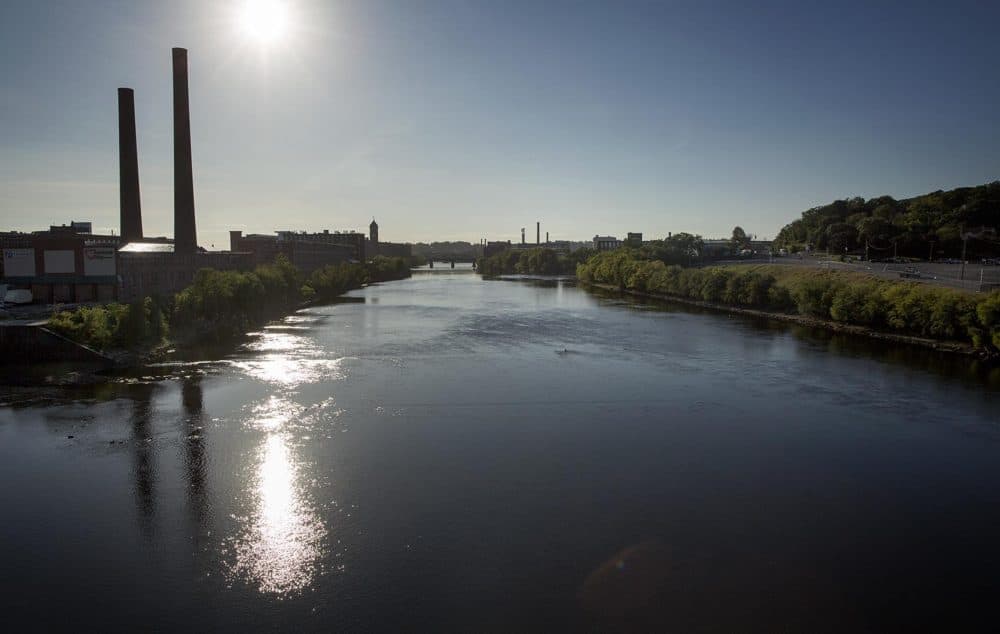Advertisement
The EPA's New Water Rule: 5 Takeaways For Massachusetts

In late January, the Trump administration announced new rules regarding freshwater streams, pools and wetlands in the United States. The "Navigable Waters Protection Rule," as it's called, loosens regulations for dumping pesticides, fertilizers, and other waste into waterways. Environmental groups quickly condemned the rule as a threat to ecosystems and public health, while farm and industry groups praised it as a release from onerous Obama-era regulations.
So what's the deal? Here are five takeaways for people in Massachusetts.
It All Started Way Back In 1972, With The Clean Water Act
Some rivers around here used to be pretty grim.
"I can remember when the Nashua River in Fitchburg and Leominster used to run pink and green and all these crazy colors during the day," says Mark Amato, president of the Massachusetts Farm Bureau and a farmer for more than 40 years. "So there was obviously a problem."
Congress passed the Clean Water Act in 1972, and the Environmental Protection Agency started cleaning up the chemicals that created all those crazy colors in the rivers. The EPA regulated what you could dump where — how much fertilizer, herbicides and pesticides can run off cropland into rivers, for instance.
Over time, regulations got stricter. In 2015, the Obama administration enacted the Clean Water Rule, asserting — or clarifying, depending on whom you ask — federal protection over certain bodies of water. For instance, the Obama rule protected "ephemeral" waters, like streams that only flow after heavy rain.
The Trump administration reversed the Obama-era rule. Groundwater, ditches, ephemeral streams and pools are no longer protected. Some wetlands and headwaters also lost protection.
Environmentalists Hate The New Rule
"This rule green-lights the dumping of pesticides and toxic chemicals into our waters," says Heather Govern, director of the Conservation Law Foundation's clean air and water program. "Drinking water in New England is threatened by rule changes like this, because you just won't have those same protections for smaller streams."
Govern says the rollbacks also threaten ecosystems, flood control, biodiversity, wildlife, boating, and fishing.
"Any surface waters or underground waters that receive these pollutants — excess nutrients from fertilizers and runoffs — aren't going to be regulated," says Jack Clarke, director of public policy for Mass Audubon. "It's a threat not only to the environment, this is a threat to the public health."
To Clarke, the rule change was based in politics, and not science.
"This is just consistent with the President's relentless war on nature," Clarke says.
Farmers Have A Different Take
While Govern says she has worked with many New England farmers and small business owners who supported the Obama-era regulations, Amato says the rule overreached and "essentially assumed control and management of every drop of water that landed on anyone's property."
"Anytime you needed to do anything on your property, you needed a permit from the EPA," he says.
Farmers might be more open to regulations if they were compensated for the loss of control over their land, says Amato, adding that people who want to reduce water pollution shouldn't be focusing on farm runoff, at least in Massachusetts.
"It's a question of risk," he says. "There's so little agriculture that goes on in this state. The risk is septic systems from residential communities."
He has a point: septic systems are a widely-acknowledged source of water pollution in the state, especially on Cape Cod, where a majority of homes use them. And development also presents a big threat to state wetlands and waterways.
The New Federal Rule Will Have An Impact, Despite Strong State Laws
Amato says that the new federal rule won't impact Massachusetts farmers much, because they have to follow stricter state regulations. The Massachusetts Wetlands Protection Act and the Massachusetts Rivers Protection Act, for instance, protect land bordering wetlands, rivers and streams; and strictly regulate dredging and filling.
If that's the case, why should we care about the federal rule?
"Let's take a map of the United States, erase the state boundaries, and look at the rivers and streams," Clarke says. "What goes into the water in one area can — and eventually will — end up in the waters of another area."
The Merrimack River, for instance, starts in New Hampshire and flows through Massachusetts; the Connecticut River runs through multiple states. Although most New England states have pretty good water protection laws, "it's important that we have national standards," Clarke says.
Lawsuits May Pack Less Punch
Environmentalists say multiple layers of regulation help them push back against development that may harm waterways.
"There's a reason I go to federal court over state court. When you have federal protections, it's just so much stronger," Govern says. "Oftentimes at the state court level, there [are] work-arounds where a developer is able to get what he wants."
So what's next? A coalition of environmental groups and attorneys general are expected try to block the new rule in court.
